
🤖 The term "AI safety" is being abused, perhaps deliberately, and its meaning has collapsed. Relatedly, the two different fields concerned with AI risks may both have been suddenly sidelined, perhaps deliberately, and may now be irrelevant.
My December reworking of my AI book framed the topic as a neglected middle ground between the concerns of "AI ethics" (harmful uses of current tech) and those of "AI safety" (catastrophic consequences of hypothetical future tech). 

"AI safety" is now being (ab)used to refer specifically to the least significant concern of the AI ethics field: it is possible to trick text generators into outputting derogatory diatribes against the Fr*nch.
Maybe it's a coincidence, but this seems awfully convenient for the companies producing text generators.
"We are committed to responsible development of AI safety. Look, we've ensured that our system never uses the F-word, and instead uses the properly respectful term 'people experiencing Frenchness'."
This move rhetorically relieves AI companies from addressing far more serious concerns of unethical use of AI: 

Assimilating "AI safety" to "preventing our text generator from saying the word 'Fr*nch'" could be a cynical manipulation of culture war dynamics to avoid addressing any of the actual concerns of the AI safety movement, because that would be difficult (or, fr*nkly, impossible).
Back in September, I warned that the AI ethics/safety split was likely to get appropriated by the culture war, in which case all serious discussion of risks might become impossible: 

ChatGPT has inserted AI into a public consciousness to an extent that discussion will likely now be dominated by lumbering dinosaurs: Congressional committees, lobbying companies hired by Mooglebook PR departments, the NYT and WSJ, all clueless and self-interested.
I fear that both the AI ethics and AI safety movements are now minuscule powerless rodents unnoticed among the feet of slow-moving gigantic new players with brains the size of walnuts.
• • •
Missing some Tweet in this thread? You can try to
force a refresh









